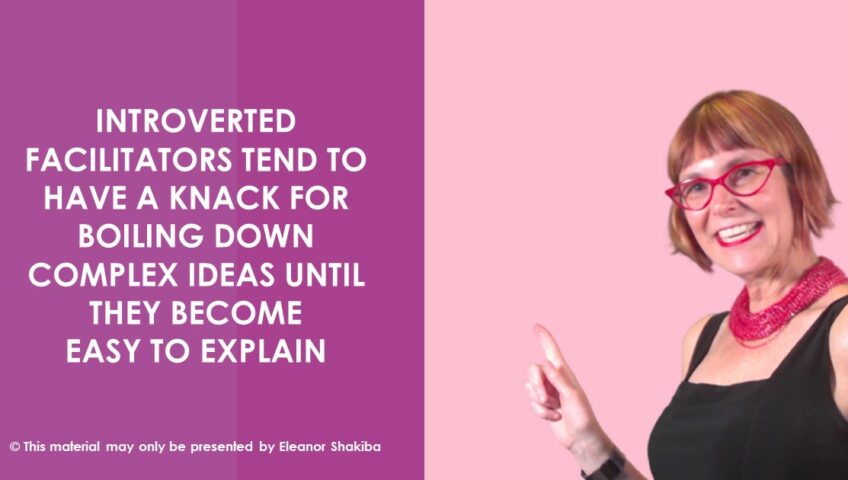Most people assume I am an extravert. After all, I spend my days working with groups and being centre stage of learning experiences. However, I have a strong preference for introversion. My delight in training comes from seeing people grow and develop rather than the performance side of training. I’ve worked with hundreds of trainers and HR specialists in my years as a consultant. This has given me ample opportunity to observe the differences between extraverted and introverted facilitators. Perhaps I’m biased, but I believe introverts are far better facilitators than more extraverted types. Not sure you agree? Here are four key strengths I observed in introverted facilitators.
Introverts read the room superbly
Especially when they have a well-developed intuitive function, introverts have an outstanding ability to pick up and understand the buy in a room. This means they spontaneously intervene in ways which redirects group energy. Many of the best facilitators I’ve known have been introverts with a flair for detecting subsurface conflict or resistance. The most gifted of these, are usually also exceptionally skilled at helping individuals work through tension points or zones of disagreement.
They listen to understand
Ah, yes. We all know introverts are fabulous listeners. This is because they pay attention to subtle changes in body language and tonality, which may be overlooked by more extraverted types. In facilitation context, this strength powers up the introvert’s ability to understand and connect with group members.
Introverts condense complex ideas into simple messages
This makes them great trainers. Introverts prefer to fully develop ideas before expressing them. This means that introverted facilitators tend to have a knack for boiling down complex ideas until they become easy to explain. Learners therefore often experience introverted trainers as easy to understand and skilled in teaching frameworks and models.
Introverts put the spotlight on others, not themselves
To me, this is the greatest strength of the introverted facilitator. It enables the introverts to guide learning or decision-making processes, whilst at the same time seemingly being invisible. This helps foster a safe learning environment. And it also means that group members find it easier to engage in meaningful conversation and experimentation.
Overall, as I matured in my own facilitation approach, I’ve come to realise that my introverted preference is a huge bonus. It occasionally leads me to become worn out after too much group interaction. But my introversion also allows me to work as a trusted partner to many inspiring groups and individuals. Many of whom would have no idea that I’m not an extravert at all!
Eleanor Shakiba is a specialist in positive psychology and resilience training. She is the author of the Positive Psychology Toolkit for HR and L&D Practitioners. Download your copy of this inspiring free resource for facilitation experts here.
About the author: Eleanor Shakiba
Eleanor is a specialist in positive psychology. Her passion is teaching talented people to use social and emotional intelligence to excel in business. These skills centre around building positive mindsets, proactive communication habits and purposeful leadership behaviours. Eleanor’s qualifications include degrees and diplomas in Social Anthropology, Positive Psychology, Counselling, Coaching, Adult Education and Neuro Linguistic Programming. She is also the author of the Positive Psychology Toolkit for HR and L&D Practitioners. This is a free resource for trainers and facilitators.
